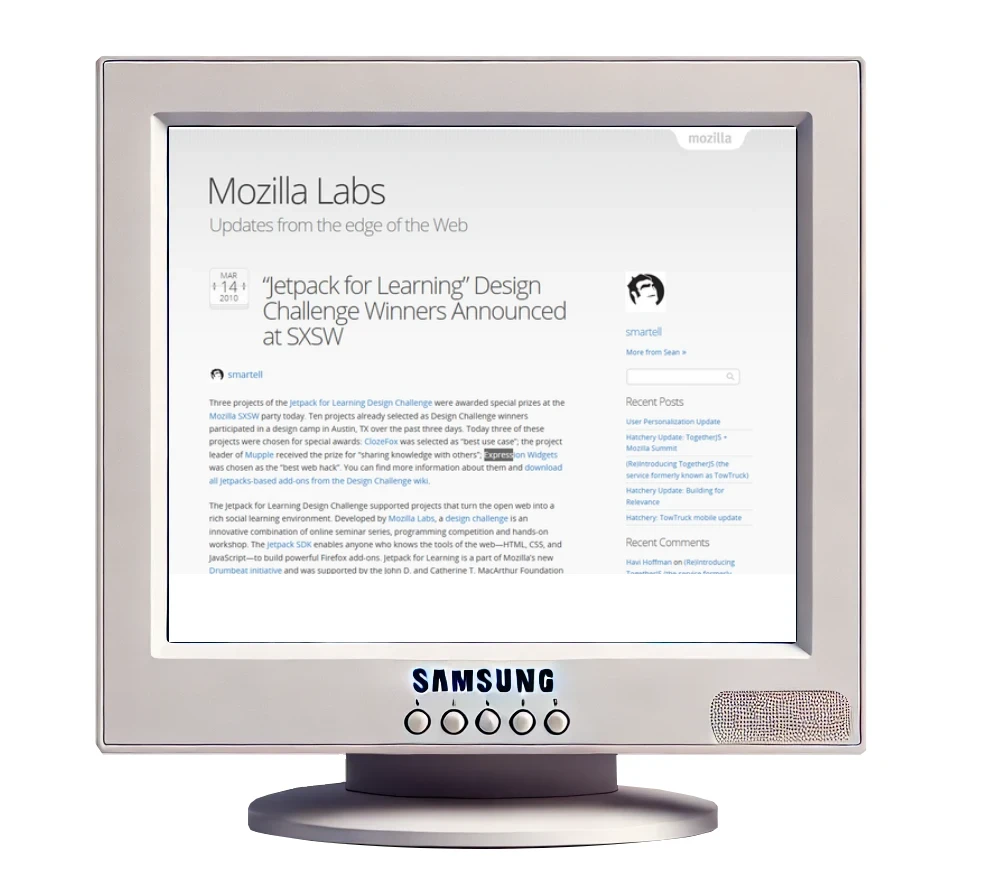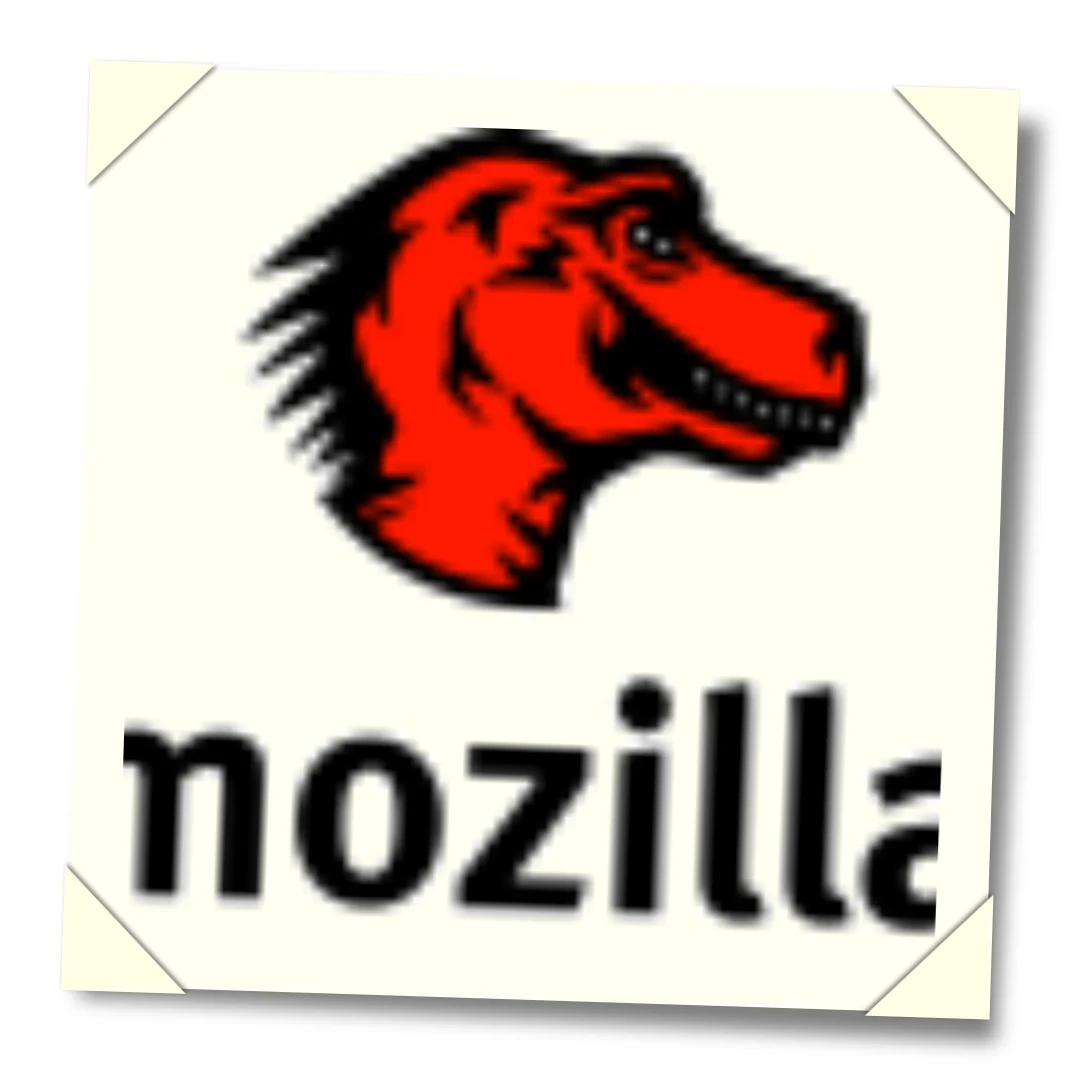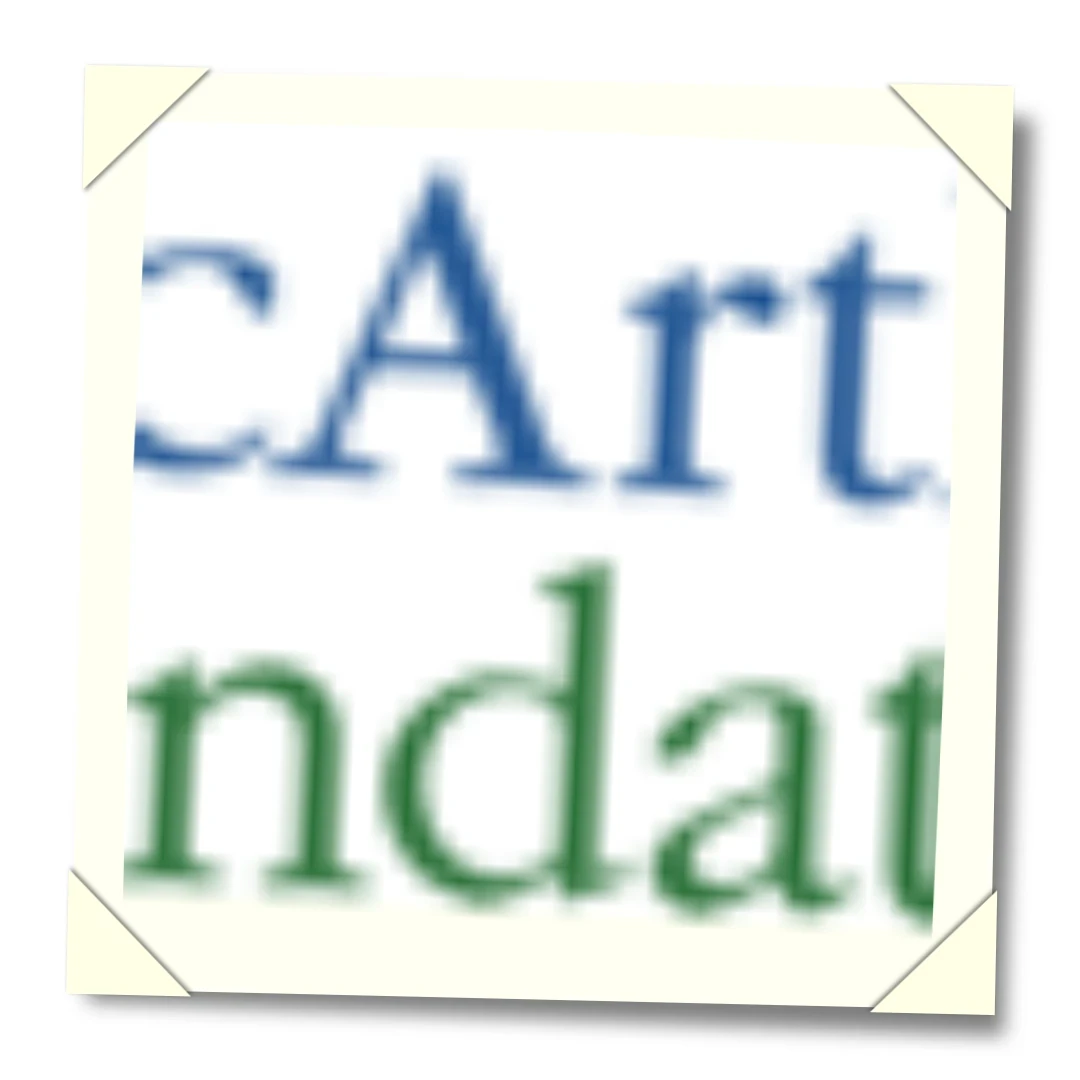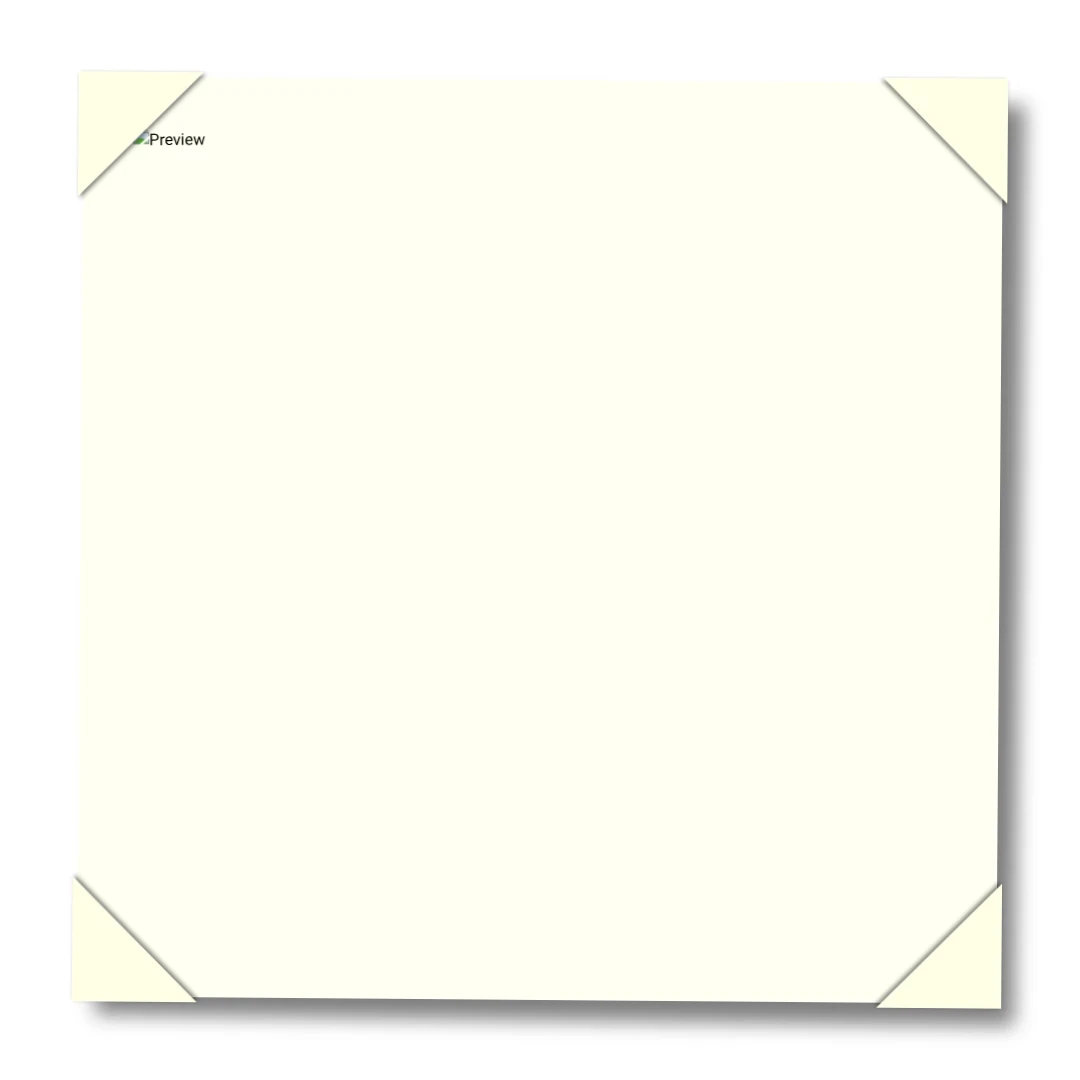This article documents the effort lead by Marcio S Galli, referred as Expression Widgets, which resulted in a participation in design contest sponsored by Mozilla and MacArthur Foundation. This challenge was a 5 months effort. Expression Widgets was selected as a winner within the category "Best Web Hack".
Judges: Pascal Finette the leading Mozilla's Open Innovation Group; Aza Raskin, chief of User Experience for Mozilla Labs, later chief designer for Firefox; Mark Surman, then an executive director for the Mozilla Foundation.
PR posts by Mozilla collaborators: Erica Jostedt, Philipp Schmidth, Mark Surman, Aza Raskin on Jetpack, Nicole Loux on Mozilla Labs Introduces Jetpack, Call for Participation
Introduction
On March 14th, 2010, Expression Widgets was announced as a winner within the "best web hack" category:
"Three projects of the Jetpack for Learning Design Challenge were awarded special prizes at the Mozilla SXSW party today. Ten projects already selected as Design Challenge winners participated in a design camp in Austin, TX over the past three days. Today three of these projects were chosen for special awards: ClozeFox was selected as “best use case”; the project leader of Mupple received the prize for “sharing knowledge with others”; Expression Widgets was chosen as the “best web hack”. You can find more information about them and download all Jetpacks-based add-ons from the Design Challenge wiki." (Smartell, 2010)

Notes on the challenge
The Jetpack for Learning Design Challenge, a collaboration between the Mozilla Foundation and the MacArthur Foundation, aimed to foster educational innovation through open web technologies. The challenge encouraged participants to create learning tools using Mozilla's Jetpack technology, aligning with Mozilla's mission to promote openness, participation, and distributed decision-making in Internet life. This initiative was part of the broader Mozilla Education effort, which engages with educational institutions globally to cultivate a new generation of contributors to open-source projects.
The MacArthur Foundation, known for supporting creative and effective solutions to global challenges, contributed through its Digital Media and Learning Initiative. This initiative explores how digital media impacts youth development and influences educational institutions such as libraries, museums, and schools.
Challenge overview
- Total duration - 5 months, from 26 October 2009 to 16 March 2010.
- Selection phases - Submission Phase: Opened 26 October 2009, with submissions due by 1 December 2009. Selection Phase: By 4 December 2009, up to 60 participants were chosen for the online course. Online Course Phase: Conducted through December 2009 and January 2010, with a holiday break. Prototype Selection: In the last week of January 2010, the most promising projects were identified, and up to 10 participants were chosen for the Austin event.
- Austin, SxSw milestone - promising projects selected to the Jetpack for Learning Design Camp: Held in Austin, TX, from 10 to 12 March 2010, coinciding with SXSW Interactive; participants engaged in design workshops and showcased their prototypes.
- Final selection - Winners Announced: On 12 March 2010, during the Mozilla SXSW party: ClozeFox: Best use case, Mupple: Sharing knowledge with others, Expression Widgets: Best web hack.
References on sponsors

"The Mozilla Foundation is a non-profit organization that sponsors the Mozilla project and devotes its resources to promoting openness, innovation and opportunity on the Internet. We do this by supporting the community of Mozilla contributors and by assisting others who are building technologies that benefit users around the world. Through the Mozilla Education initiative we work with computer science, design and business schools around the world to create learning opportunities for a new generation of Mozilla community members and help to drive a new wave of participatory, student-led learning. By doing this we hope to move closer to Mozilla's broader goal of making openness, participation and distributed decision-making more common experiences in Internet life. More information is available at education.mozilla.org." See archive

"The MacArthur Foundation supports creative people and effective institutions committed to building a more just, verdant, and peaceful world. In addition to selecting the MacArthur Fellows, the Foundation works to defend human rights, advance global conservation and security, make cities better places, and understand how technology is affecting children and society. In 2006 MacArthur launched its digital media and learning initiative to explore how young people are changing as a result of digital media use and what the implications are for libraries, museums and schools. More information is available at www.macfound.org/education." See archive
Celebration

Brendan Eich – In 2009, Brendan Eich was serving as the CTO of Mozilla, continuing his work on advancing open web technologies, including JavaScript, which he created in 1995. At this time, Mozilla was making strides with Firefox, challenging proprietary web technologies.
Joi Ito – In 2009, Joi Ito was CEO of Creative Commons, advocating for free culture and open access to creative works. He was also an influential figure in the world of venture capital and digital activism, helping shape the direction of internet freedom and innovation.
Mark Surman – In 2009, Mark Surman was the Executive Director of the Mozilla Foundation, focusing on fostering Mozilla’s mission to keep the internet open and accessible to all. He was instrumental in community engagement and promoting open-source projects.
Aza Raskin – In 2009, Aza Raskin was the Creative Lead at Mozilla Labs, working on innovative projects related to user interface design and web technologies. He is known for his contributions to design thinking and the creation of the infinite scroll.
Pascal Finette – In 2009, Pascal Finette was leading Mozilla's Open Innovation Group, focusing on creating strategies to foster innovation and community-driven projects within the open-source ecosystem. He played a significant role in scaling Mozilla's initiatives globally.
Expression Widgets project documentation
- Priourly hosted at http://taboca.github.com/Expression-Widgets/; Note: text in brackets were made in 2025, March 10th, by Marcio S Galli.
Background and abstract
This project supports the JetPack for Learning Project web archive link organized by Mozilla and supported by Mozilla, MacArthur Foundation, and other peers. The original ideas to this project are based on Felipe Gomes and Marcio Galli motivation, said initial motivation. We were students from the same university in Sao Carlos Brazil and we since we are Mozilla contributors we started talking about means, being tools or systems, to support the development of open resources to support education. The original motivation was something like a note book where students could share their notes, for a given lecture of live session.
An annotation system that uses JetPack infra-structure and introduces a concept of expression widgets. The model leverages the browsing experience and JetPacks are used to support learners to annotate using Web language, given a live session - let's say a lecture given by a professor. The model is suggested initially as a rich annotation and collaboration framework where students can interact with a variety of Web-based widgets. It explores various communication forms such as text, canvas-based drawing, SVG, MathML, and also some interactive scenarios where teams can build together. The annotated resources are organized and kept using simple wiki pages with less rules to the server and more focus on possibilities for team-centred conventions.
Licensing and Trademark Notice
This project is subject to be licensed using an OSI-approved license. This is part of agreement as part of the Jetpack for Learning Design Challenge project which is coordinated by Mozilla, McArthur Foundation and others. The name Expression Widgets is trademark of Marcio dos Santos Galli informatica. Additional terms may apply associated with the use of the trademark.
Expression Widgets is part [a participant entry, a collaboration] of the JetPack for Learning, an effort to support open education. The project proposes a system that leverages the web browsing experience and the JetPack infra-structure, and support learners to collaborate and produce open-based educational resources. The model proposes a collaboration environment where students express their thoughts as part of ongoing sessions, such as a lecture given by a professor. To support students to contribute to educational resources, Expression Widgets introduces a number of pre-developed widget modules. This model explores various communication forms such as text, canvas-based drawing, SVG, MathML, and also suggests other interactive scenarios where teams can build more complex structures together. The annotated resources are organized and kept using simple wiki pages with less rules to the server and more focus on possibilities for team-centred conventions.
Credits
According to the original submission page Marcio Galli has indicated the contributions of other alumni colleagues from University of São Paulo, Thiago Campos ( student at ICMC/USP ) and a special thanks to Felipe Gomes ( alumni at ICMC/USP ) for original design and brainstorming prior to this challenge submission. ICMC/USP is the computer science department at Sao Carlos, part of University of Sao Paulo. This project is not affiliated to ICMC however the faculty department served as great inspiration for us to come up with new ideas to help the develoment of open-based educational systems.
References
- Smartell. (2010, March 14). “Jetpack for Learning” Design Challenge Winners Announced at SXSW. Mozilla Labs. https://blog.mozilla.org/labs/2010/03/jetpack-for-learning-winners/ web archive
- Expression Widgets page in Mozilla Wiki
- Design Note - Ideas about templates
- Design Note - Reusing Resources and How to Socialize Jetpacks
- Technical Note - Reusing icons from Firefox
- Technical Note - Learning the Jetpack prototype architecture
- Technical Note - Our build system**
- Technical Note - Programming my first Jetpack-based extension with the Jetpack SDK
- Design Note - Brainstorming about a mash server that comes with a client extension
- Design Note - Instructions**
- Mozilla Jetpack for Learning Design Challenge